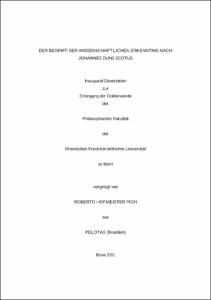Der Begriff der wissenschaftlichen Erkenntnis nach Johannes Duns Scotus

Der Begriff der wissenschaftlichen Erkenntnis nach Johannes Duns Scotus

| dc.contributor.advisor | Honnefelder, Ludger | |
| dc.contributor.author | Hofmeister Pich, Roberto | |
| dc.date.accessioned | 2020-04-06T06:54:19Z | |
| dc.date.available | 2020-04-06T06:54:19Z | |
| dc.date.issued | 2002 | |
| dc.identifier.uri | https://hdl.handle.net/20.500.11811/1862 | |
| dc.description.abstract | John Duns Scotus (1265/1266-1308), together with William of Ockham the most important franciscan thinker of the Middle Ages, has contributed with originality to philosophy mainly in the areas of metaphysics, ethics and epistemology. The present thesis investigates one of the most significant moments of Scotus' epistemology, that is, his conception of "scientia" or "scientific knowledge". The concept of "scientia" is investigated basically in Scotus' Prologue to his Ordinatio, parts 3 and 4, where the doctor subtilis questions whether theology - as "theologia nostra" and as "theologia in se" - has a scientific character or not. The analysis of the text was made in comparison with the other relevant versions of it, that is, the Prologue to the Lectura, Reportatio parisiensis I A and Reportata parisiensia. Following the presentation of the themes by Scotus himself, the work analyses the concepts of "scientific knowledge", "habit of knowledge", "subject" and "object" of a scientific habit. Furthermore, the modal analysis of being and knowledge by Scotus - in terms of necessity and contingency, comprising the related notions of abstraction ("cognitio abstractiva") and intuition ("cognitio intuitiva") - receives in the whole study a special attention. The questions concerning theology and science in the Prologue to the Ordinatio are also discussions about and a critical reception of the Aristotelian theory of scientific knowledge by Duns Scotus. Scotus shows here his understanding of the extension of the concept of "episteme" in the Posterior analytics. Particularly because of his conception of intuition, God's knowledge of contingent truths and the human access to contingent facts Scotus challenges in some ways the traditional conception of science, so that he specifies differently as Aristotle the characteristics which really constitute a "scientia". At the end Scotus offers five models of scientific knowledge, whose distinguishing marks can change according to the the modality of the truths of the habit and according to the "status" of the intellect which has to know scientifically certain propositional truths. The thesis includes a chapter with a complete analysis of the theory of subordination of sciences and of the unity of science according to Scotus. The conclusion of the work brings a recapitulation of the main steps of the investigation and exposes its conclusions. Moreover it offers some ways of seeing the relevance of Scotus' understanding of scientific knowledge to the philosophy of Ockham, to the present "foundationalism" in epistemology and to philosophical theology. | en |
| dc.language.iso | deu | |
| dc.rights | In Copyright | |
| dc.rights.uri | http://rightsstatements.org/vocab/InC/1.0/ | |
| dc.subject | Wissenschaft | |
| dc.subject | Scientia | |
| dc.subject | Objekt der Wissenschaft | |
| dc.subject | Kontinuenz | |
| dc.subject | Notwendigkeit | |
| dc.subject | Habitus | |
| dc.subject.ddc | 100 Philosophie | |
| dc.title | Der Begriff der wissenschaftlichen Erkenntnis nach Johannes Duns Scotus | |
| dc.type | Dissertation oder Habilitation | |
| dc.publisher.name | Universitäts- und Landesbibliothek Bonn | |
| dc.publisher.location | Bonn | |
| dc.rights.accessRights | openAccess | |
| dc.identifier.urn | https://nbn-resolving.org/urn:nbn:de:hbz:5-01104 | |
| ulbbn.pubtype | Erstveröffentlichung | |
| ulbbnediss.affiliation.name | Rheinische Friedrich-Wilhelms-Universität Bonn | |
| ulbbnediss.affiliation.location | Bonn | |
| ulbbnediss.thesis.level | Dissertation | |
| ulbbnediss.dissID | 110 | |
| ulbbnediss.date.accepted | 24.08.2001 | |
| ulbbnediss.institute | Philosophische Fakultät : Institut für Philosophie | |
| ulbbnediss.fakultaet | Philosophische Fakultät | |
| dc.contributor.coReferee | Kluxen, Wolfgang |
Dateien zu dieser Ressource
Das Dokument erscheint in:
-
E-Dissertationen (692)




